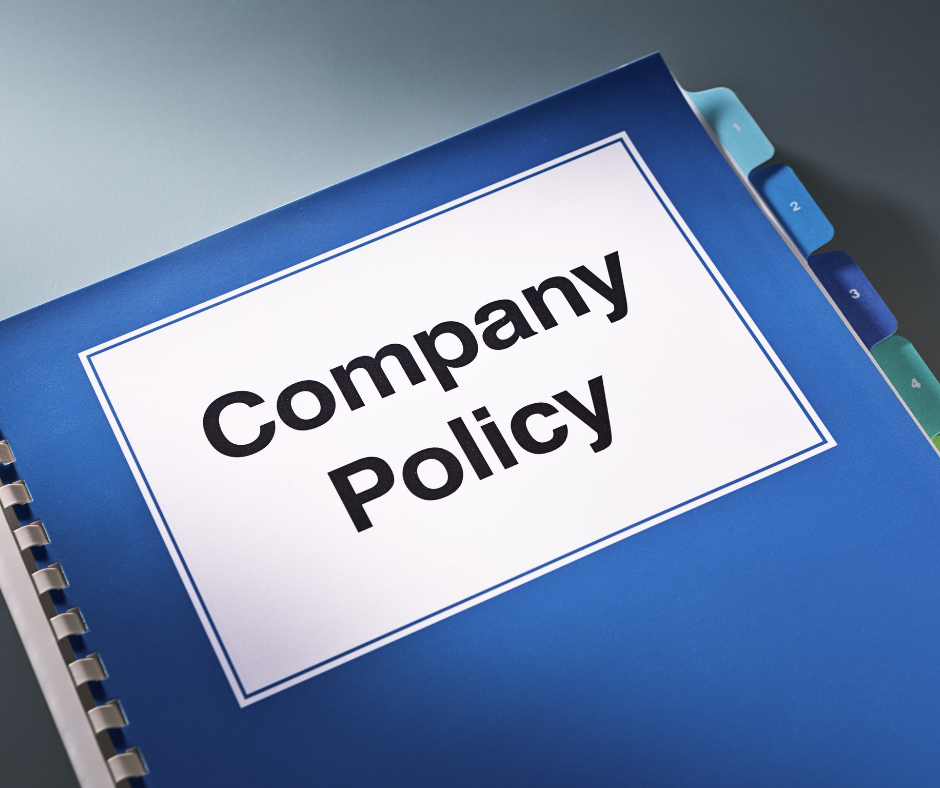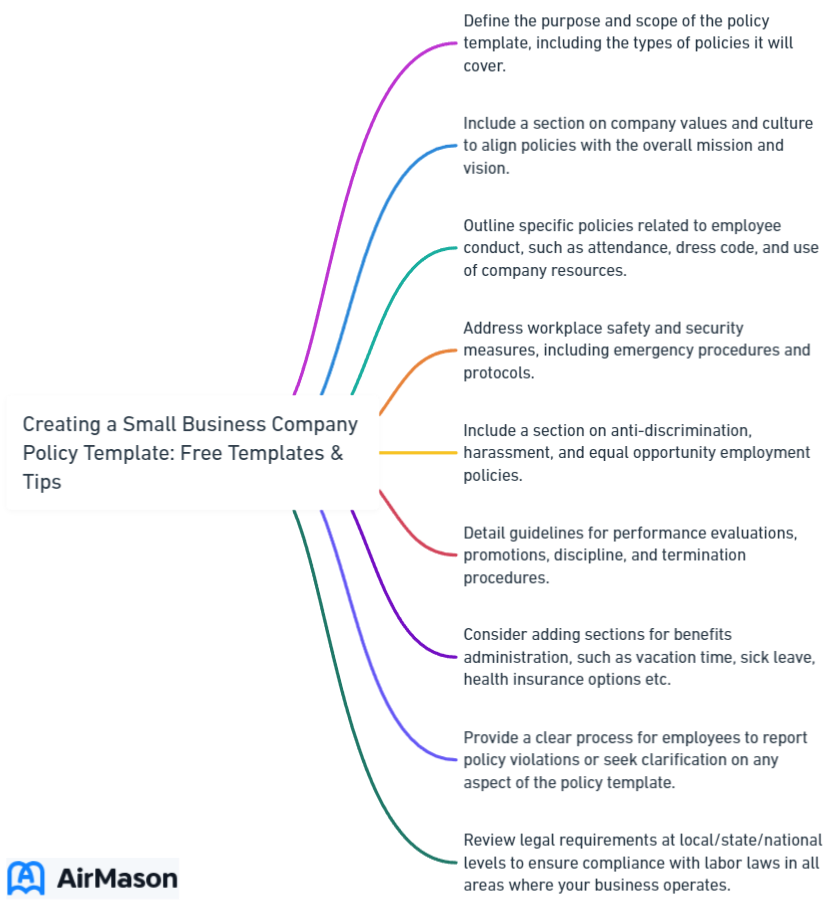
Are you looking to create effective company policies for your small business? It’s crucial to have clear policies in place to maintain consistency, promote organizational values, and ensure compliance with regulations. Thankfully, you don’t have to start from scratch – there are free small business company policy templates available to help you save time and resources. In this blog post, we’ll guide you through understanding company policies, provide you with free small business company policy template options, and share tips on customizing and implementing these templates to suit your unique business needs.
Key Takeaways
- Understanding small business company policies is essential for promoting consistency and adhering to regulations.
- Free policy templates are available to help businesses save time & customize policies for workplace safety, data protection & employee conduct.
- Best practices include documenting, communicating & regularly reviewing/updating policies to ensure compliance with applicable laws and regulations.
Understanding Small Business Company Policies
Before we start talking about the role company policies play in business operation, let’s first start with company policies definition. Company policies play a vital role in maintaining consistency, upholding organizational values, and adhering to regulations in small businesses. No matter if you’re crafting a company’s policy document from the ground up or using a policy and procedure template, the document should be formatted for easy reading and comprehension.
Policies are the backbone of your company, providing a framework of guidance and direction for your organization, ensuring consistency, and ensuring adherence to organizational values, goals, regulations, and standards.
The role of company policies is twofold. They serve as employee guidelines, helping employees make decisions and take actions that align with the organization’s objectives. Secondly, they cover various aspects of your business operations, such as workplace safety, data protection, and employee conduct.
Well-defined policies pave the way for achieving long-term objectives, pursuing continuous improvement, minimizing or averting risk, and steering towards regulatory adherence.

The Role of Company Policies
Company policies act as the foundation of your small business, guiding employee behavior and decision-making to achieve business goals. When creating policies, it’s essential to consider the needs of your organization and your employees. Utilizing pre-made templates, constructing one from the ground up, or consulting employees and enlisting an external consultant are all viable options to create policies that align with your company’s values and objectives.
Clearly defined policies guarantee a uniform approach to diverse aspects of your business operations, including workplace safety, data protection, and employee conduct.
Key Components of Company Policies
An effective company policy should have several key components, such as purpose, scope, responsibilities, and enforcement. The purpose of a policy is to convey expectations to staff and delineate their duties and obligations.
A well-crafted policy and procedure template should accurately convey the organization’s vision and objectives, be actionable, consistent, logical, adaptable, and beneficial while providing legal protection for the company. Using policy and procedure templates, as well as procedures templates, can offer various benefits, such as low cost, speed, and consistency, as well as easy adoption, sharing, collaboration, real-time notifications, intuitive navigation, and archiving.
To ensure your policies comply with all applicable laws and regulations, it’s crucial to be aware of legal requirements and consult with legal counsel when necessary.

Free Small Business Policy Templates
This section includes a list of complimentary policy and procedure templates ready for customization and application in your small business. These templates cover various areas such as workplace safety, data protection, and employee conduct. Utilizing free policy templates can help save time by providing guidance and reducing the time needed for approval or modifications if a consistent format is employed.
Free policy templates can be located from professional associations, government departments, and other websites. Let’s explore some of the most useful templates for small businesses.
Workplace Safety Policy Template
A customizable Workplace Safety Policy Template is crucial for integrating workplace health and safety into all aspects of your company’s operations. The template aims to reduce the risk of injury to persons and property and ensure adherence to and enforcement of applicable health and safety regulations concerning working conditions and the work environment.
It covers tactics for recognizing hazards, evaluating risk, and instituting control strategies. Additionally, it offers guidance on employee safety training, hazard inspections, and emergency management.
Data Protection Policy Template
Data protection is a critical aspect of any business, and a customizable Data Protection Policy Template can help you outline measures to safeguard sensitive information and ensure compliance with data protection policies and privacy regulations.
Confidential information policy templates provide guidance to ensure employees handle sensitive information in a confidential manner and are aware of the legal repercussions for mishandling or leaking such information.
The Information Security Policy and Procedure Template outlines requirements for:
- Encryption algorithms
- Acceptable use of equipment and computing services
- Employee information security measures
- Protection of corporate resources and proprietary information
Employee Conduct Policy Template
An Employee Conduct Policy Template outlines the expectations for employee behavior, such as dress code, attendance, and acceptable use of company resources. It is essential to create a policy that reflects your company’s values and culture.
The Electronic Communication Policy and Procedure Template:
- Emphasizes the responsible use of electronic tools
- Outlines the professional and legal use of electronic communication
- Ensures the confidentiality of proprietary or other sensitive information is not compromised.
Additionally, other conduct-related templates, such as the Non-smoking Policy and Procedure Template, are designed to protect all staff members, both smokers and non-smokers, as well as company visitors or customers, by ensuring compliance with the organization’s policies regarding employee welfare.

Tips for Customizing and Implementing Policy Templates
While customizing and implementing policy templates, tailoring them to the organization is imperative for optimal adaptation. Review existing policies to ensure they are current and applicable to the organization.
The subsequent subsections offer advice on:
- Adapting complimentary policy templates to your unique small business
- Conveying policies effectively to employees
- Maintaining current and effective policies through regular reviews and updates.
Adapting Templates to Your Business
Adapting policy templates to your business requires the following steps:
- Read through the template to understand its content.
- Consider the purpose of the policy and evaluate its applicability to your business.
- Reflect on the goals of the policy and how it can be tailored to meet your organization’s specific needs.
- Take into account the values and culture of your business when customizing the policy.
By following these steps, you can effectively adapt policy templates to suit your business requirements.
Utilize clear and concise language and keep sentence length to a minimum to ensure clarity and conciseness. Additionally, be aware of legal requirements and consult with legal counsel to guarantee that the policy is compliant with all applicable laws.
Communicating Policies to Employees
Effective communication of policies to employees is crucial for their successful implementation. Utilize language that is straightforward and free of technical jargon when writing policies to ensure they are easily understood.
Distribute policies through a variety of mediums, including email, the company intranet, and the employee handbook, to ensure employees are able to access and review the policies. Organize training sessions or orientation programs to thoroughly explain the policies, allowing employees to raise queries and clear up any uncertainties they may have.
To ensure that employees are informed of any alterations to the policies, communicate such changes through the same channels used to disseminate the initial policies.

Regularly Reviewing and Updating Policies
Regularly reviewing and updating policies is of great importance for numerous reasons. It ensures:
- Compliance with applicable laws and regulations
- Adaptation to changing circumstances
- Consistency and clarity in decision-making
- Employee awareness and engagement
- Effective risk management.
Review and revise policies on a regular basis to:
- Guarantee that they remain up to date and comply with any modifications in legal requirements
- Adapt to new risks, technologies, or market conditions
- Identify any discrepancies or ambiguities in policies and allow for clarification or refinement
- Keep employees informed about any changes or updates.
Establish a regular schedule for review and modification as necessary, and inform staff of any changes that have been made.
Creating Your Own Small Business Policy Template
Should you opt to create a custom policy template from scratch, taking into account factors such as your company’s size, industry, and legal requirements is essential when employees use their own device.
The subsequent subsections will guide you in determining your business’s specific policy needs, crafting clear and concise policies, and incorporating essential components into the policy template.
Identifying Policy Needs
Assessing your company’s specific policy needs is critical for creating effective company policies. To identify your business’s policy needs, you should:
- Gather information about the company’s size, industry, and legal requirements.
- Engage with stakeholders to ensure the policy template is tailored to the company’s unique needs.
- Consider potential legal issues, employee safety, and data protection when determining policy requirements.
Evaluate the priority of policy areas by considering factors such as the company’s size, industry, and legal requirements.
Writing Clear and Concise Policies
To write clear and concise company policy, follow these best practices.
- Use language that is straightforward and uncomplicated, ensuring the policies are easily understood by your employees.
- Arrange the information logically.
- Use clear and precise language.
- Use formatting methods that are easily readable.
By following these practices, you can create policies that are clear and easy to understand.
Keep your policies concise and to the point, so employees can quickly grasp the policy’s intent and requirements.

Including Necessary Components
When constructing a small business policy template, it is suggested to include the following components:
- Introduction
- Policy statement
- Scope
- Definitions
- Responsibilities
- Procedures
- Compliance
- Consequences
- Communication
- Review and revision
These components ensure that your policy is comprehensive and addresses all relevant aspects of the policy area, such as legal mandates, organizational values, and worker duties.
By including these necessary components, you can create a policy template that is thorough, effective, and easy to implement in your small business.
Legal Considerations and Compliance
Ensuring that your company policies comply with relevant laws and regulations is crucial for the success and sustainability of your small business. Legal considerations may vary depending on the jurisdiction and the specific policies being implemented, so it is important to ensure that all relevant regulations are taken into consideration when creating your policy templates.
In the following subsections, we’ll discuss the importance of understanding legal requirements and consulting with legal counsel to ensure that your company policies are legally sound and compliant.
Understanding Legal Requirements
Researching and understanding legal requirements when developing company policies is essential to ensure compliance with applicable laws and regulations. To identify the legal requirements for your small business policy templates, gather information about the company’s size, industry, and legal requirements.
It is also important to be aware of any new regulations that may impact your business and update your policies accordingly.
Consulting with Legal Counsel
Consulting with legal counsel when creating a small business policy template offers several advantages, such as:
- Ensuring legal compliance
- Managing risk
- Customizing the template
- Protecting employees
- Future-proofing the policy
Legal counsel can help you identify potential risks and liabilities, offer guidance on how to customize the policies to suit the specific requirements of your business, and ensure that your policies are compliant with all applicable laws.
It is advisable to consult with legal counsel when creating a small business policy template when the policies involve intricate legal matters, such as those associated with employment law, data protection, or intellectual property.

Best Practices for Policy Management
Effective management of your company policies is key to the success of your small business. This section shares best practices for policy management, encompassing policy documentation, communication to employees, and regular reviews and updates by upper management.
By following these best practices, you can ensure that your policies remain current, effective, and compliant with all applicable laws and regulations.
Documenting Policies
Properly documenting company policies in an organized and accessible manner is essential for their successful implementation. To create a policy document, recognize the policy, gather all pertinent information pertaining to the policy, and compose the policy in a straightforward and succinct manner.
Ensure that the document includes sections, for example, company policy statement, objectives, responsibilities, and procedures related, and review and revise the procedure documents on a regular basis to ensure that they remain up to date and comply with any modifications in legal requirements, adapt to new risks, technologies, or market conditions. The procedure describes how to identify any discrepancies or ambiguities in policies and allow for clarification or refinement, and keep employees informed about any changes or updates.
Communicating Policies to Employees
Effectively communicating policies to employees is crucial for their successful implementation. Utilize language that is straightforward and free of technical jargon when writing policies to ensure they are easily understood.
Distribute policies through a variety of mediums, including email, the company intranet, and the employee handbook, to ensure employees are able to access and review the policies. Organize training sessions or orientation programs to thoroughly explain the policies, allowing employees to raise queries and clear up any uncertainties they may have.
To ensure that employees are informed of any alterations to the policies, communicate such changes through the same channels used to disseminate the initial policies.

Regularly Reviewing and Updating Policies
Regularly reviewing and updating policies is of great importance for numerous reasons. It ensures:
- Compliance with applicable laws and regulations
- Adaptation to changing circumstances
- Consistency and clarity in decision-making
- Employee awareness and engagement
- Effective risk management.
Review and revise policies on a regular basis to:
- Guarantee that they remain up to date and comply with any modifications in legal requirements
- Adapt to new risks, technologies, or market conditions
- Identify any discrepancies or ambiguities in policies and allow for clarification or refinement
- Keep employees informed about any changes or updates.
Establish a regular schedule for review and modification as necessary, and inform staff of any changes that have been made.
Summary
In conclusion, creating effective company policies for your small business is crucial for maintaining consistency, promoting organizational values, and ensuring compliance with regulations. Utilizing free templates and following best practices for customizing, implementing, and managing your policies can save you time and resources while ensuring the success and sustainability of your business. By regularly reviewing and updating your policies, you can ensure that they remain current, effective, and compliant with all applicable laws and regulations. So, start implementing these tips and best practices today to create a solid foundation for your small business.
Frequently Asked Questions
How do you write a short company policy?
A good company policy should be written in simple, clear language and outline topics such as health and safety, equal opportunity, code of conduct, leave of absence, and disciplinary action.
It should provide relevant procedures and take into consideration the benefits of employees by ensuring rules are fair.
What is an example of a business policy of a company?
Company policies are a set of rules and regulations that guide employee conduct, such as dress code, attendance policies, and equal opportunity policies.
Procedures for enforcing these policies are also provided.
What are the benefits of using free policy templates for small businesses?
Using free policy templates for small businesses saves time and energy, providing guidance and making approval or modifications easier.
These templates can be used to create a comprehensive set of policies that cover all aspects of the business, from employee conduct to customer service. They can also be tailored to the specific needs of the business.
How can I adapt a policy template to suit my specific business?
Read through the template and consider how it applies to your business, then tailor it to meet your needs in order to adapt it for your specific business.
What are the key components of an effective company policy?
Effective company policies should clearly articulate their purpose, scope, responsibilities, and enforcement measures.
These policies should be easy to understand and follow, and should be regularly reviewed and updated to ensure they remain relevant.
Enforcement measures should be clearly outlined and communicated to the public.
